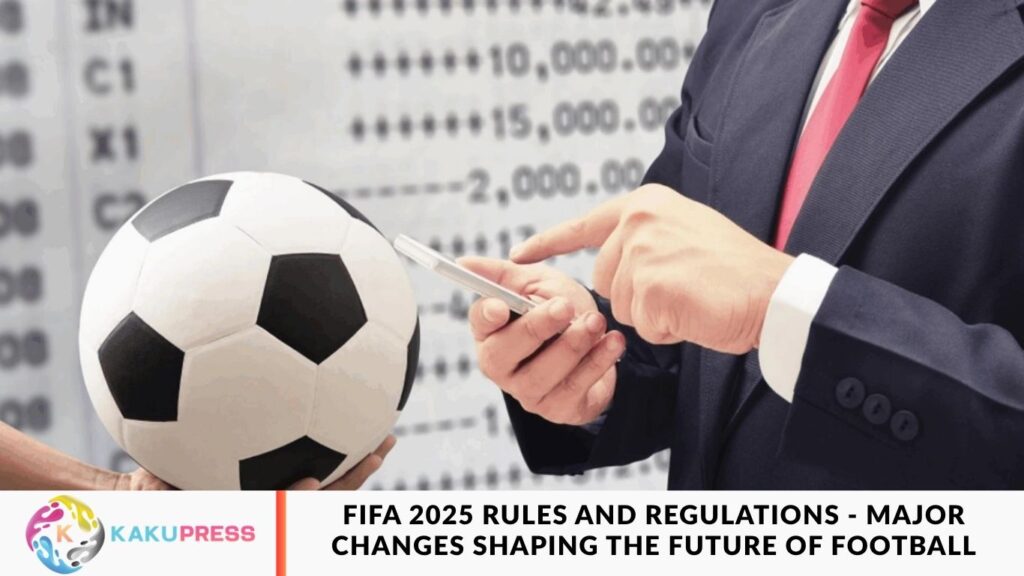FIFA introduced a series of groundbreaking rules and regulations designed to improve the pace of play, promote fair competition, and integrate modern technology into football. These FIFA 2025 rule changes have made a noticeable impact on every level of the game — influencing goalkeeper performance, referee decision-making, and overall match flow. By combining innovation with integrity, FIFA’s new regulations are shaping a faster, fairer, and more dynamic future for global football.
Goalkeeper Time-Wasting Penalties
To combat time-wasting tactics by goalkeepers, FIFA’s 2025 regulations introduced a stricter rule targeting delays in ball release. Previously, goalkeepers were allowed six seconds to release the ball, with violations rarely resulting in penalties. Now, under the new FIFA 2025 rule, goalkeepers who hold the ball for more than eight seconds will concede a corner kick to the opposing team.
Referees are also required to signal a five-second visual countdown before applying the penalty, ensuring fairness and transparency. This updated rule enhances the game’s rhythm, minimizes unnecessary stoppages, and maintains a consistent pace of play throughout the match.
Offside Rule Modification
FIFA’s 2025 rule changes include a major offside rule modification designed to encourage more attacking football. Under the proposed offside adjustment, an attacker will now be considered onside if any part of their torso aligns with the second-to-last defender.
This modernized interpretation aims to eliminate controversial offside decisions often decided by minor body parts, such as a toe or a nose. By doing so, FIFA seeks to promote fluid attacking play, increase goal-scoring chances, and make the game more exciting for fans worldwide.
Introduction of Body Cameras for Referees
To increase transparency and protect referees from verbal abuse, FIFA’s 2025 regulations require match officials to wear body cameras. These advanced devices record both audio and video, ensuring clear documentation of on-field interactions and improving accountability during matches.
The decision follows successful trials in grassroots football in England, where referee body cameras significantly reduced cases of verbal and physical abuse. Beyond safety, this innovation also enhances the viewing experience, allowing fans to enjoy unique, first-person perspectives from referees during broadcasts. This step marks a major milestone in FIFA’s commitment to fairness, safety, and technological advancement in modern football.
Expansion of the FIFA Club World Cup
FIFA’s 2025 regulations have introduced a major change to global club football by expanding the FIFA Club World Cup to 32 teams. The first expanded edition is set to take place in 2025 in the United States, featuring eight groups of four teams each. The top two teams from every group will progress to the knockout stages, making the tournament more competitive and exciting.
This historic expansion aims to create a more inclusive platform for clubs worldwide, enhancing global competition, fan engagement, and international viewership. However, critics have voiced concerns over player fatigue and fixture congestion, as the new Club World Cup schedule adds more matches to an already demanding football calendar.
Proposed Extension of Half-Time Breaks
FIFA is exploring extending the half-time break during the World Cup final to include a Super Bowl-style entertainment show. At present, the half-time interval lasts 15 minutes, as regulated by the International Football Association Board (IFAB).
Any proposed extension would require official IFAB approval, and the idea has already sparked debate across the football community. Supporters believe it could enhance the fan experience and global appeal, while critics warn that longer breaks may impact player performance and recovery. Notably, CONMEBOL’s 2021 proposal to extend half-time to 25 minutes was rejected due to concerns over player welfare, highlighting the delicate balance between entertainment and athlete well-being.
Changes to FIFA Eligibility Rules
The Football Association of Wales proposed revisions to national team eligibility rules, allowing players to represent a home nation if they have been registered with a club in that territory for at least five years.
This eligibility rule change aims to expand the talent pool for national teams, reflecting the modern dynamics of player development and movement across clubs. For the proposal to take effect, it requires the approval of The Football Association, Scottish Football Association, and Irish Football Association, highlighting the collaborative approach needed to update international football regulations.
Frequently Asked Questions
What are the major changes in FIFA 2025 rules and regulations?
FIFA 2025 introduces updates, including a stricter goalkeeper time limit, modifications to the offside rule, the use of referee body cameras, an expanded Club World Cup, and potential half-time extensions to enhance gameplay, fairness, and the fan experience.
How does the new goalkeeper rule work in 2025?
Goalkeepers now have eight seconds to release the ball. Exceeding this limit results in a corner kick for the opposing team, and the referee gives a five-second visual countdown before enforcing the penalty.
What changes were made to the offside rule?
Under FIFA 2025, an attacker is onside if any part of their torso is in line with the second-to-last defender, reducing marginal offside calls and encouraging more attacking play.
Why are referee body cameras being introduced?
FIFA 2025 regulations include body cameras for referees to document interactions, prevent verbal abuse, and provide fans with a unique first-person match perspective, improving transparency and accountability.
How has the FIFA Club World Cup changed in 2025?
The Club World Cup has expanded to 32 teams, featuring eight groups of four with the top two teams advancing to the knockouts. This aims to increase global competition and fan engagement, though concerns over player workload remain.
Is FIFA considering extending the World Cup half-time break?
Yes, FIFA is exploring longer half-time intervals for a Super Bowl-style entertainment show, but any extension would require IFAB approval and raise concerns about player welfare and match integrity.
What is the new eligibility rule proposed by the Football Association of Wales?
Players can now represent a home nation if they have been registered with a club in that territory for five years, pending approval from the FA, Scottish FA, and Irish FA, aiming to broaden the talent pool.
Conclusion
The FIFA 2025 rules and regulations mark a significant evolution in modern football, balancing fair play, technological innovation, and fan engagement. From goalkeeper time limits and offside adjustments to referee body cameras, an expanded Club World Cup, and potential half-time entertainment, these changes are designed to speed up gameplay, reduce controversies, and make football more exciting worldwide.

